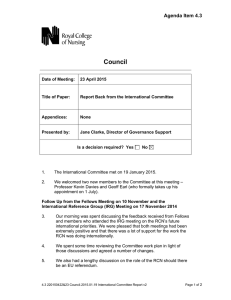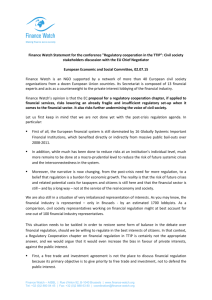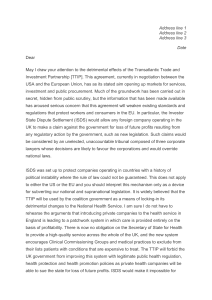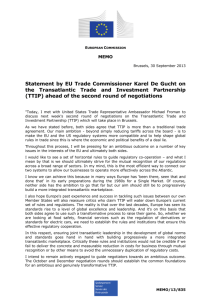Transatlantic Trade and Investment Partnership (TTIP)
advertisement
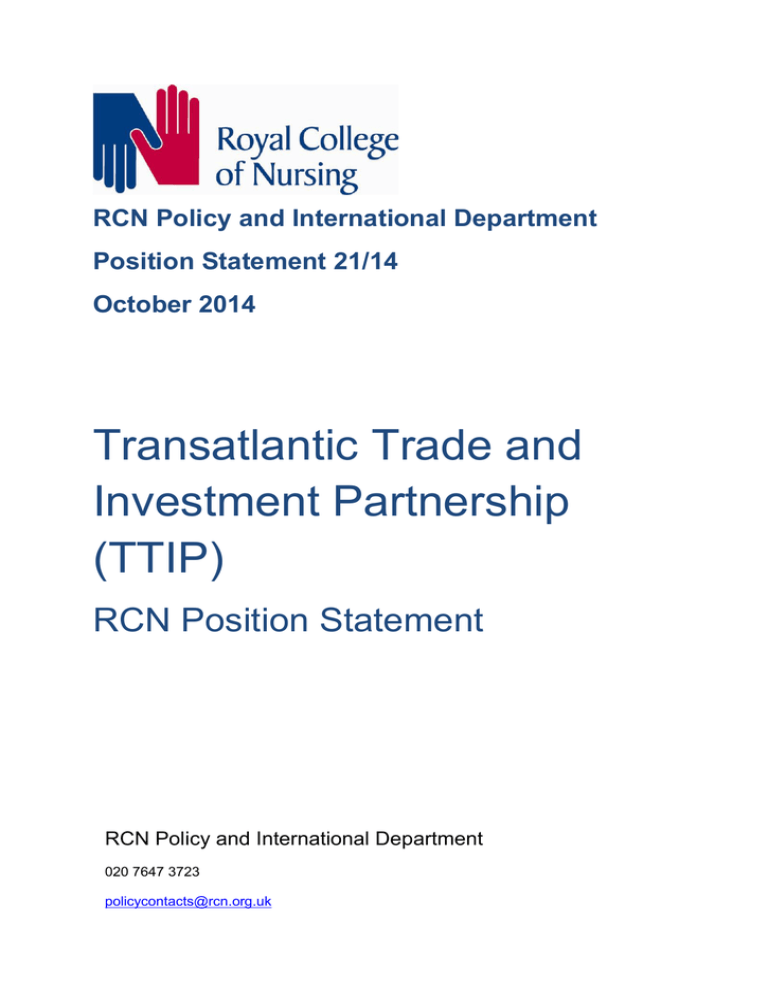
RCN Policy and International Department Position Statement 21/14 October 2014 Transatlantic Trade and Investment Partnership (TTIP) RCN Position Statement RCN Policy and International Department 020 7647 3723 policycontacts@rcn.org.uk www.rcn.org.uk/policy Transatlantic Trade and Investment Partnership Background The Transatlantic Trade and Investment Partnership (TTIP) is a trade agreement that is being negotiated between the European Union and the United States. The stated aims of TTIP are to remove trade barriers to make it easier to buy and sell goods and services between the EU and the US. If health services were not exempted from TTIP, it would cause them to be traded in much the same way. While there is no set date for the agreement to be concluded it is expected that if a deal is to be reached it will need to be in place by the end of 2015. There are widespread concerns that TTIP is being negotiated in secret, with a purely economic focus and with little attention to the impact on public services. As part of TTIP, public service standards between the US and EU will be harmonised, with a lowest common denominator approach to make trading between the two easier. There is very real concern that this will adversely affect patient care and members’ terms and conditions of work, and could potentially lower the overall standards of care. TTIP could further open up the NHS to American private businesses, which could be legally able to sue if future governments decide to change existing legislation in relation to health services. There is concern that this could lead to further marketisation within the NHS and prevent repeal of existing legislation which has encouraged marketisation of the NHS. Another area of concern with TTIP is the investor-state dispute settlement (ISDS), which would allow an unelected tribunal to pass judgement on member state legislation in relation to compatibility with TTIP. The European Commission conducted a consultation on this mechanism to which the RCN responded. This lack of legal clarity and potential for legal challenge may also mean that governments refuse to adopt progressive legislative measures in relation to health policy, leading to regulatory ‘chill’ in health. RCN Congress resolution In June a resolution was debated at RCN Congress that ‘this meeting of Congress urges Council to lobby against the inclusion of health services in the Transatlantic Trade and Investment Partnership’. The debate demonstrated that a huge number of RCN members hold real concerns about TTIP and the impact on health services, while also raising wider questions and concerns about potential privatisation of the NHS. Congress shared those concerns, with over 97 per cent of those voting in the debate supporting the resolution. The points raised at the debate have shaped the five key priorities which underpin the RCN’s position statement as follows: Any agreement between the EU and the US on TTIP should have an explicit reference to health services being excluded from the directive. Any agreement on TTIP must also ensure that national governments are able to pursue future public policy objectives without fear of legal proceedings from US investors. The sovereignty of national governments being able to organise and manage their health care systems must be preserved. This must include the ability for national governments to change existing legislation in relation to health services should they wish to do so – for example in England in relation to repealing Section 75 of the NHS Act 2012. Any agreement on TTIP must exclude the ISDS mechanism, which would undermine the existing national legal arrangements in each member state to deal with investor protection and undermine the sovereignty of national courts by introducing a tribunal to rule on investor disputes which would bypass national courts. The ongoing negotiations on TTIP must become more open and transparent. This principle also applies to the ISDS mechanism which would, by its very nature operate in secret and behind closed doors. The European Commission has made public announcements that public services will be excluded. However unless the negotiations and text are made public then the uncertainty will remain as to the extent to which this covers health services. Next Steps The RCN will be lobbying both at EU and domestic level to ensure that health services are removed from any future TTIP agreement, contacting MPs and MEPs to set out our concerns and encouraging individual members to do the same. We will also working closely with other EU alliances and UK stakeholders who share similar views to ensure that health services are removed.
